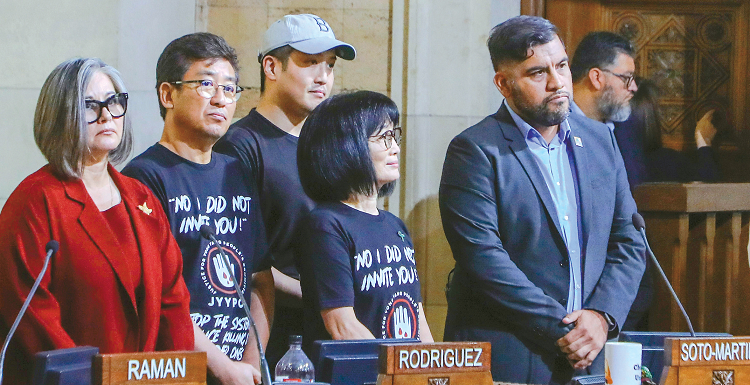The Los Angeles City Council has officially memorialized Yong Yang, a mentally ill Korean American man who was fatally shot by an LAPD officer, for the first time 139 days after the incident.
On September 17, Yang’s family stood at the dais at the LA City Council meeting.
It was Councilmember Hugo Soto-Martinez of Council District 13, a first-term member of Los Angeles City Council, who invited the family to the dais, not the Korean American councilmember.

He stood next to the family and began to read a long eulogy with a trembling voice as his emotion was palpable as he spoke about the incident.
“A young man with bipolar disorder was shot and killed by police in the living room of his parents’ home without medical help,” Soto-Martinez said, “and I hope that an impartial investigation will soon be completed so that the family and the community can heal their wounds.”
As he read his eulogy, the council’s streaming video screen showed a series of photos of Yang and his close-knit family.
Underneath the memorial photo of Yang singing was the name of Councilmember Hugo Soto-Martinez instead of the Korean-American councilmember.
He read his eulogy nearly for three minutes. This is the first time a city councilmember has publicly memorialized the family of a community member killed in a police shooting by inviting them to the council chambers. This speaks about how respectful and considerate he was of the family.
“I have seen people who have lost their family members and friends from police violence,” Soto-Martinez said, “and I felt that the Yang family should not be turned away.”
Soto-Martinez’s unprecedented decision to invite the family stood in stark contrast to the promises and silence of Korean American elected officials regarding Yang’s case.
As Soto-Martinez’s voice filled the council chamber, more than 40 Korean Americans stood in front of the council members on the podium with pickets. The pickets contained messages condemning the police brutality and mourning Yang’s death, showing a silent cry against the authorities. Korean American media reporters were also present to capture the scene.
At the end of the eulogy, when Council President Paul Krekorian asked for a call to recess, Korean-American Councilmember John Lee of Council District 12, who had not made a statement about Yang’s case, took the microphone.
“My sincere condolences to the family,” he said briefly, before lowering the microphone. His message lasted about 10 seconds.
Whether his message was genuine or he was simply self-conscious of the Korean Americans and reporters gathered in the council chamber is unknown.
What is clear is that the councilman’s message did not resonate with the bereaved family and the Korean Americans at the council meeting.
“No Korean-American elected officials have shown interest in Yong’s case and contacted us until now,” said Yang’s father, Min Yang. “I would like to tell them to think back to the Korean Americans who helped with the election and fundraising.”
Lee did not visit the family after the council meeting. Instead, the only time he smiled for the cameras was when he stood next to officials of the Los Angeles Korean Festival Foundation, which has been embroiled in a legal battle between its former and current board of directors, and delivered a certificate of appreciation from the city council to show his closeness to the Korean American community.
Lee also did not show up at the subsequent picket by Korean Americans and bereaved families on the front lawn of City Hall. Only Soto-Martinez’s office followed through.
The Korea Daily spoke with Soto-Martinez after the meeting. “We are all saddened by this horrible death,” he said, ”and we will stand with the Korean American community to ensure a thorough investigation.”
This should have been what a Korean-American politician had to say. Why does a Korean American community need a Korean-American politician who doesn’t speak out on sensitive community issues? This day, the community’s slogan of “Korean American political empowerment” went in vain.
BY BRIAN CHOI, HOONSIK WOO [choi.inseong@koreadaily.com]





